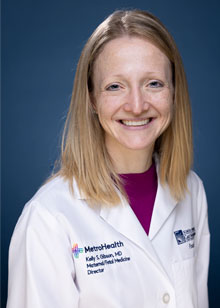Any pregnancy comes with risks for both mother and unborn child—but those risks are greater for Black women, who are three times more likely to die from pregnancy-related complications than white birthing patients, regardless of socioeconomic status.
Kelly Gibson, MD, Division Director of Maternal Fetal Medicine at MetroHealth, specializes in high-risk pregnancies, and breaks down what Black women especially need to know before, during and after pregnancy.
Understanding Risks
Healthcare disparities during pregnancy are complicated. Much of Black women’s risk for pregnancy complications stems from structural racism, distrust of the medical community, and lack of access to care, says Dr. Gibson. For the Black community, common pregnancy-related complications include:
- High blood pressure: Pregnancy can make chronic high blood pressure, or hypertension, even worse. Even women who do not have a history of high blood pressure can develop it during pregnancy.
- Preeclampsia. Hypertension during pregnancy can lead to preeclampsia, a serious condition that can lead to preterm delivery, seizures, strokes and even death. Some women can develop preeclampsia without first developing hypertension.
- Gestational diabetes. Hormonal shifts can cause some women to develop high blood sugars. Risk factors include being overweight or obese. “Being Black is not a risk factor specifically for gestational diabetes. But so many of our patients of color do develop gestational diabetes,” Dr. Gibson says. Resources available to prevent and control gestational diabetes include nutritional counselors and MetroHealth’s Food as Medicine program.
- Preterm birth. In the United States, preterm birth is the leading cause of infant mortality. Babies born early have a higher risk for complications that decrease the likelihood of surviving their first year of life.
- Mental health issues. Along with the general risk for postpartum depression that all women face, Black women often feel stress and anxiety simply seeking medical care, says Dr. Gibson. “It goes back to structural racism, and the historical injustices done to the Black community by medical providers and hospitals.”
Planning For a Healthy Pregnancy
At MetroHealth, you and your baby’s health are at the center of our care. “We provide the full spectrum of pregnancy care providers, from midwives up to high-risk doctors, depending on your medical history,” Dr. Gibson says. Care for a healthy pregnancy includes:
- Preconception care. If you are thinking of becoming pregnant, see a healthcare provider first, to be sure you start out as healthy as possible.
- Prenatal care. Once you are pregnant, your provider will screen you for risk factors that may cause complications and develop a care plan tailored for you. For example, if you have high blood pressure or risk factors for pre-eclampsia, you will be checked more frequently and can receive a home blood pressure cuff to help catch any changes to your blood pressure early.
- Postpartum care. For one year after giving birth, your provider will continue to follow your physical and mental healthcare closely. Ohio has expanded Medicaid to include one year of postpartum care.
Working to Eliminate Disparities
To provide better pregnancy care to Black women specifically, MetroHealth has partnered with Birthing Beautiful Communities. This community-based organization provides doulas who offer emotional, informational, and physical support during pregnancy, birth and the first year postpartum.
Better pregnancy care is part of MetroHealth’s focused efforts to eliminate disparities in healthcare throughout an individual’s lifetime.
“Disparities in pregnancy are going to lead to disparities in women when they are 50, 60, 70 and beyond. Pregnancy is a prime opportunity to help achieve health equity for the next several decades, not just for those nine months,” says Dr. Gibson.
For more information, or to schedule an appointment, visit metrohealth.org/obgyn
or call 216-778-4444.












